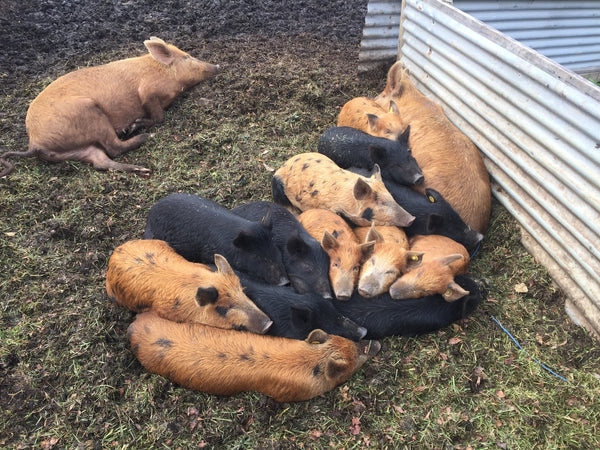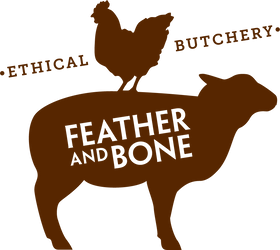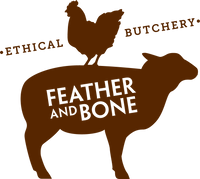Looking the animal in the eye - farm visits
The week before last, Mr Bone and the Excellent Apprentice trotted off to the Southern Highlands to visit two farms and 'look the animal in the eye'. This is always a bitter-sweet experience. While it's lovely to see animals thriving on regeneratively-managed farms, it's also sobering to welcome the same animals into our coolroom not long after seeing them in a paddock. But we're very lucky because we find that, in our corner of the world, there is beauty and respect for the animals in both places - including at your table. Knights Hill and Eramboo, the two farms the blokes visited on Sunday, were no exception.
1. Knights Hill Farm ~ Speckle Park beef
Marcus Hewitt and Sharon Loveday's 100 acre farm sits in the cool air on the escarpment above Jamberoo in the Southern Highlands. It's rich and fertile country - deep volcanic soil over granite with an average rainfall of three metres. When they bought the farm 10 years ago, it was a high chemical-input, commercial flower farm but Knights Hill is now regeneratively-managed and chemical-free. Marcus and Sharon still produce a small quantity of seasonal flowers for sale but they also run two small herds of Speckled Park and Galloway cattle and a commercial-scale composting operation and worm farm. Initially, they battled problems of acidification, loss of soil structure and fertility caused by the chemicals and land management practice of the previous owners. But, after eight years of without synthetic inputs and consistent application of worm 'tea' and compost, they're seeing real recovery and improvement in the soil profile and a growing diversity of plants in the pasture.
Speckle Park are noted for their hardiness, weight gain and marbling and they're also docile and inquisitive, as the boys found on Sunday when the heifers walked up and nuzzled them. Last week we received the 360 kg carcass of the big, healthy Speckle Park heifer on the left in the shot at the top of this newsletter - too large to be quartered so she arrived in eight pieces.
It's an impressive carcass with a wonderful layer of the golden fat that is typical of healthy, pasture-fed and finished cattle and the meat is marbled and full of promise.
We'll hang the carcass and dry age the prime cuts for three to four weeks but next week we'll start to take off the cuts with less cover like the skirt and shin. Last Saturday Will and Milko made some Knights Hill burgers - just beef mince, salt and pepper corns - which were ridiculously delicious. They sold out quickly but we'll make some more this week.
Above: Knights Hill Speckle Park cows. Below: A calf tests the flavour of the Excellent Apprentice's boot, much to Marcus Hewitt's amusement.


Above: Post-lunch siesta for the Eramboo Tamworth sows and seven month-old litters. Below: Eramboo farm landscape.

2. Eramboo Farm ~ Tamworth/Black pigs
Eramboo Farm sits in the hilly section at the back of the Upper Kangaroo Valley, between the Southern Highlands and the coastal strip and contains significant sections of remnant bush with some very rare, old Red Cedars - the ones the early timber cutters didn't get. Peter Botsman bought Eramboo Farm in 1996 and set about achieving Demeter Bio-dynamic certification. Over the years he's let the official certification lapse but continues to manage the farm according to bio-dynamic principles, running a herd of Highland cattle with very pure Balmoral genetics and pasture-raising a small herd of very appealing heritage-breed, Tamworth-cross pigs.
Tamworth are rare-breed, small, hardy, slow-growing pigs with long snouts and Peter has two pure-bred Tamworth sows that he's crossed with a black boar. As well as farming, 'Botsman is a leading inter-disciplinary public intellectual' who has worked and published across a broad range of public policy areas including extensive involvement in supporting Aboriginal enterprises in Northern Australia. He's off up North shortly for an extended period and needs to disperse his small herd of pigs which is where we come in.
Last week we received four, seven month-old pigs between 17 and 22 kg so those lucky enough to have ordered a pig and a spit within those sizes will shortly be tucking into this wonderful, rare-breed pork.





Leave a comment